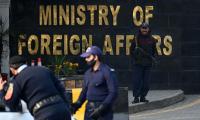ADB issues fact sheet about Pakistan
Islamabad
Different consultant firms and individuals have pocketed $45.32 million out of total loans, grants and technical assistance provided by Asian Development Bank (ADB) to Pakistan during the last five years from January 1, 2012 to December 31, 2016 for providing consultancy services.
According to ADB’s fact sheet about Pakistan stating on Wednesday that individual consultants earned $13.46 million for providing ‘solutions’ to the different sectors of the national economy on the name of consultancy services. The consultants who are commonly known for providing ‘cut and paste solutions’ have earned significant amounts in last five years. There is need to analyse that how much the country’s economy benefited from these consultancies, said an independent economist.
However, the ADB shared details that the National Engineering Services Pakistan Pvt. Ltd was provided $10.53 million as they provided consultancy services for agriculture, natural resources, and rural development (ANR).
Bak Consulting Engineers have been provided $4.39 million for suggesting solutions related to ANR out of financing provided by the ADB. The G3 Engineering Consultants Pvt. Ltd obtained $2.67 million for providing solutions to Transport (TRA) sector.
The National Development Consultants Pvt. Ltd. & National Engineering Services Pakistan Pvt. Ltd as joint venture (JV) have been provided $2.16 million for presenting solutions to transport sector.
The Engineering General Consultants Pvt. Ltd is provided $1.54 million, individual consultants $13.46 million and others $10.57 million out of total loans, grants and technical assistance provided by the ADB in last five years.
The contractors/suppliers from Pakistan involved in goods, works, and related services contracts under ADB’s loans and grant projects from January 1, 2012 to December 31, 2016, total provided amount for contractors related amount stood at $2.680 billion.
Out of total amount of $2.680 billion, Descon Engineering Ltd earned $183.94 million for working into ANR sector, Pak Elektron Ltd earned $110.79 million for working into energy sector, Siemens (Pakistan) Engineering Co., Ltd $86.80 million for energy sector, Ghulam Rasool & Co., Pvt. Ltd $78.49 million for ANR and transport sectors, Maqbool Associates Pvt. Ltd $64.51 million and others $2.156 billion in last five years period.
Cumulative disbursements to Pakistan for lending and grants financed by ordinary capital resources, the Asian Development Fund, and other special funds amount to about $20.79 billion. A reliable supply of power is critical for Pakistan to reach its economic growth targets. Projects in the energy sector comprise over half the ADB portfolio for the country, which includes $900 million for the Jamshoro Power Generation Project. ADB is helping finance hydropower projects, coal fired power plants, energy-efficiency programmes, and innovative clean energy initiatives. ADB also provides support for energy planning, capacity development, and regional trading initiatives for power and gas.
In 2016, ADB provided a loan of $325 million to enhance Pakistan’s energy security. The project aims to build 1,000 micro-hydropower plants and rooftop solar plants for schools and healthcare facilities which will benefit over 4 million people, including 1.2 million girls in Khyber Pakhtunkhwa and Punjab provinces. ADB is helping upgrade highways and provincial roads to position Pakistan as a future regional trading hub. It is working with other development partners to help improve the country’s vital north south road network. The project aims to promote economic growth, create jobs, and enhance regional connectivity. In Punjab—Pakistan’s breadbasket—ADB is providing $900 million to rehabilitate and upgrade obsolete irrigation infrastructure and associated facilities, including key barrages. This will reduce water losses and improve water delivery systems, benefitting millions of farmers.
In Sindh province, ADB has approved a loan of $100 million to strengthen standards in the development and delivery of public-private partnerships and help bridge the infrastructure investment gap. The government of the United Kingdom is co-financing the project, contributing a grant of $19.23 million and $4.75 million in technical assistance, both of which will be managed by ADB. The project cost is $188.98 million, with the Sindh government contributing $65 million.
Pakistan is highly vulnerable to droughts, earthquakes, floods, and cyclones. In 2016, ADB approved a loan of $200 million to strengthen Pakistan’s disaster risk management. This includes support to the National Disaster Risk Management Fund, to reduce the country’s vulnerability to natural hazards as well as climate variability and change. As part of the support, ADB has approved a $1 million technical assistance grant for capacity building of disaster risk management institutions. ADB will also administer a $3.3 million grant provided by the government of Australia. To help implement reform and restructure selected public sector enterprises, ADB approved the $300 million Public Sector Enterprises Reform Programme in 2016. ADB continues to assist the Benazir Income Support Programme. The $430 million cash transfer programme helps extend income support to poor families and Pakistan’s most vulnerable groups, especially women.
Since its inception, ADB has approved $1.25 billion in non-sovereign financing for 33 private sector transactions in Pakistan. Total outstanding balances and commitments of ADB’s private sector transactions in the country as of 31 December, 2016 was $623.5 million, representing 6.4% of ADB’s total non-sovereign portfolio. ADB’s Trade Finance Programme (TFP) fills market gaps by providing guarantees and loans through partner banks in support of trade. The TFP has done over 14,000 transactions supporting over $26 billion in trade and over 9,300 small and medium-sized enterprises in Asia and the Pacific since 2004. In 2016, the TFP supported $3.1 billion in trade through over 2,080 transactions.
In Pakistan, the TFP works with 12 banks and has supported $10.8 billion in trade between 3,750 transactions. In addition to filling market gaps, the TFP’s objective is to mobilise private sector capital/involvement in developing Asia. In Pakistan, 53% of the $10.8 billion in trade supported through the TFP was co-financed by the private sector.
ADB’s procurement contracts in Asia and the Pacific for goods, works, and related services under loan and grant operations totaled $11.09 billion in 2015 and $11.42 billion in 2016. Cumulative procurement since 1966 was $158.68 billion covering 206,915 contracts.
In Pakistan, 17,028 contracts worth $14.41 billion were awarded to contractors and suppliers within the same period. Consulting Services ADB’s procurement contracts in Asia and the Pacific for consulting services under loan, grant, and technical assistance operations totaled $655.31 million in 2015 and $612.46 million in 2016. Cumulative procurement since 1966 was $11.26 billion covering 52,232 contracts. In Pakistan, 2,137 contracts worth $258.80 million have been awarded to consultants within the same period.
Regarding operational challenges, the ADB states that Pakistan significantly strengthened macroeconomic fundamentals following completion of a 3-year support programme with the IMF, which ended in September 2016. Inflation was lowered to single digit, foreign reserves were restored, and the budget deficit was markedly reduced. The government also launched tax reform to improve revenue performance, restructure the power sector. However, Pakistan must continue to address governance and security issues, improve productivity, increase exports and attract investment, strengthen public enterprises, and improve the country’s business and regulatory environment. To convert the recent macroeconomic achievements into sustained and higher economic growth, Pakistan will need to stay on the course of implementing structural economic reforms, the report concluded.
A delegation from Timor-Leste, headed by Ms Veronica Das Dores, Minister of Social Solidarity and Inclusion, on a...
Pakistani Ambassador to China Khalil Hashmi seen in this image. — APP/FileIslamabad:China-Pakistan investment and...
In this image, Child Protection Institute building can be seen. — X/@mohrpakistan/File Islamabad: Child Protection...
The National University of Modern Languages building seen in this image released on November 11, 2022. —...
President of the International Islamic University Islamabad , Prof Dr Hathal bin Hamoud Al-Otaibi, and Rector IIUI, Dr...
A representational image of a handcuffed person behind bars. — AFP/FileRawalpindi:In a significant breakthrough,...







